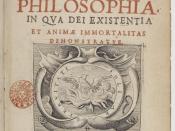Descartes' book Meditations is a work in which he attempts to achieve absolute certainty about three issues: the soul as "a thinking thing" distinct from or without a body, the belief that God exists, and the belief that the external world exists. I am interested in the impact that these ideas have on the question of a rational belief in God.
Initially after reading portions of Descartes work, I am led to believe that thinkers build on what others have thought. Sometimes they criticize, deny, or accept a previous opinion. However, the trajectory that I see indicates a move in philosophy away from any philosophical anchor for religious belief (the medieval view: philosophy and theology are one). The new view claims that it is more reasonable to be a skeptic [3].
To determine which of his beliefs could meet the above conditions, Descartes subjected them to a series of skeptical hypotheses.
In order to acquire absolutely certainty in the issues at hand, Descartes first uses doubt as a foundation of truth on which to build his knowledge [1]. He rejects all of what he believes to be true or factual and instead chooses that if any belief can be doubted it is not certain. Descartes first gets rid of any information, knowledge, or truths that are based on his senses. His most powerful idea is that there is an evil genius trying to deceive him. This challenged not only the belief that the physical world exists, but also the belief in mathematics. He calls into question the validity of reason itself. Yet Descartes reasons that not even an evil genius deceives someone into believing falsely that he exists because doubt itself cannot be doubted. Therefore, the doubter must exist. His famous motto "cogito, ergo sum" stems from this line...


